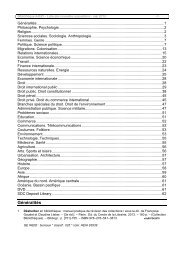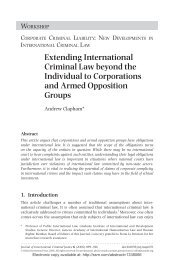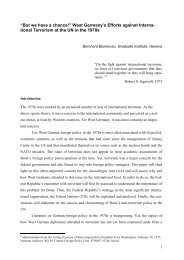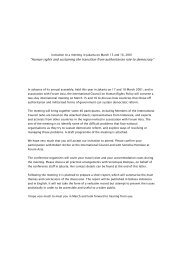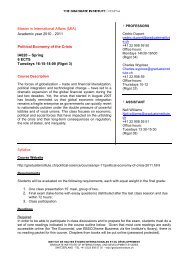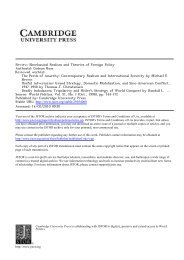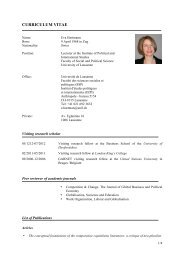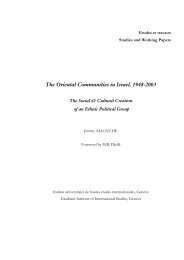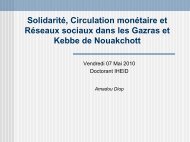Download - The Graduate Institute, Geneva
Download - The Graduate Institute, Geneva
Download - The Graduate Institute, Geneva
You also want an ePaper? Increase the reach of your titles
YUMPU automatically turns print PDFs into web optimized ePapers that Google loves.
manipulate the normativity question for other purposes. Playing down the<br />
normative quality of diplomatic assurances helps human rightists 63 argue that their<br />
influence to risk assessment in the non-refoulement test is minimal. But at the same<br />
time, their worry about the person involved in the deportation leads them to insist<br />
on a “hardening” of the assurances to such extent that these assurances ultimately<br />
become indistinguishable from hard law. On the contrary, States that strategically<br />
asserted the bindingness of diplomatic assurances against death penalty in order to<br />
bolster the conformity of extradition procedures, find themselves today forced to<br />
radically change their position in order to avoid accountability in case of breach of<br />
those insufficient assurances, while maintaining that the assurances effectively<br />
reduce the risk of torture.<br />
One may feel, however, that there is something missing in the above analysis<br />
of the normativity question. And indeed there is one shade in the normative<br />
spectrum that has not been directly put forward with regard to diplomatic<br />
assurances by either side. This is the soft law thesis – in its broadest sense as we will<br />
explain in the following part. It is our view that the reason for not invoking soft law<br />
may be traced back to the way the normative discourse has been shaped in the case<br />
of soft law. Consequently, it is now necessary to examine these normative narratives<br />
in order to illustrate why recasting diplomatic assurances in terms of soft law is<br />
impossible.<br />
III. Diplomatic Assurances as Soft Law?<br />
<strong>The</strong> phenomenon of soft law has emerged as a necessity in order to cover the<br />
area between legal and moral/political undertakings. 64 Soft law “denotes those<br />
instruments which are to be considered as giving rise to legal effects, but do not (or<br />
not yet perhaps) amount to real law”. 65 Various phenomena have been qualified as<br />
falling within the scope of soft law. Soft law ranges from treaties providing for<br />
aspirational norms or political promises – that is soft obligations, 66 to informal<br />
instruments including precise obligations and resolutions and codes of conduct<br />
63<br />
It is Professor Alain Pellet that coined this expression; see Alain Pellet, Human Rightism and International Law,<br />
10 ITALIAN YEARBOOK OF INTERNATIONAL LAW (2001), pp. 3-16.<br />
64<br />
Tammes, A.J.P., Soft Law, in ESSAYS OF INTERNATIONAL & COMPARATIVE LAW IN HONOUR OF JUDGE ERADES,<br />
1983, <strong>The</strong> Hague, Nijhoff, pp. 187-195.<br />
65<br />
Klabbers, Jan, <strong>The</strong> Redundancy of Soft Law, op. cit., note ??, at 168.<br />
66<br />
Sztucki, Jerzy, Reflections on International "Soft Law", in FESTSKRIFT TILL LARS HJERNER. STUDIES IN<br />
INTERNATIONAL LAW, 1990, Norstedts, pp. 549-575, at 551. In this case, the rules usually consist of vague goals<br />
to be achieved in the future or general guidelines rather than prescriptive rules and strict obligations; see<br />
Dupuy, Pierre-Marie, Soft Law and the International Law of the Environment, 12 MICHIGAN JOURNAL OF<br />
INTERNATIONAL LAW (1990-1991), pp. 420-435, at 428; Rosenne, Shabtai, DEVELOPMENTS IN THE LAW OF<br />
TREATIES: 1945-1986 (1989), Cambridge, CUP.<br />
13


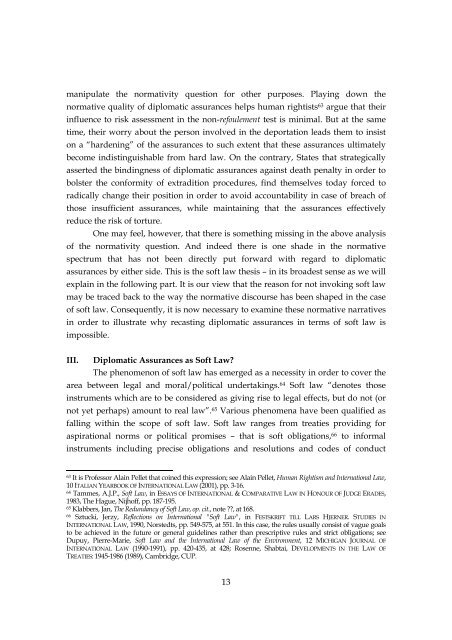
![Download [pdf] - The Graduate Institute, Geneva](https://img.yumpu.com/23370020/1/190x248/download-pdf-the-graduate-institute-geneva.jpg?quality=85)
